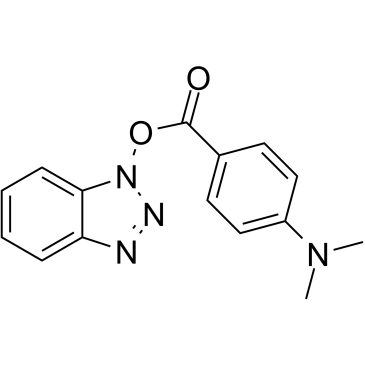
XP-59
CAS No. 890402-73-0
XP-59( —— )
Catalog No. M21756 CAS No. 890402-73-0
XP-59 is a potent inhibitor of the SARS-CoV Mpro, with a Ki of 0.1 μM.
Purity : >98% (HPLC)
 COA
COA
 Datasheet
Datasheet
 HNMR
HNMR
 HPLC
HPLC
 MSDS
MSDS
 Handing Instructions
Handing Instructions
| Size | Price / USD | Stock | Quantity |
| 2MG | 67 | In Stock |


|
| 5MG | 110 | In Stock |


|
| 10MG | 178 | In Stock |


|
| 25MG | 318 | In Stock |


|
| 50MG | 484 | In Stock |


|
| 100MG | 672 | In Stock |


|
| 200MG | Get Quote | In Stock |


|
| 500MG | Get Quote | In Stock |


|
| 1G | Get Quote | In Stock |


|
Biological Information
-
Product NameXP-59
-
NoteResearch use only, not for human use.
-
Brief DescriptionXP-59 is a potent inhibitor of the SARS-CoV Mpro, with a Ki of 0.1 μM.
-
DescriptionXP-59 is a potent inhibitor of the SARS-CoV Mpro, with a Ki of 0.1 μM.
-
In VitroThe SARS-CoV main proteinase (Mpro) plays a central role in the formation of the viral replicase/transcriptase complex and is thus an ideal target for the development of suitable drugs.
-
In Vivo——
-
Synonyms——
-
PathwayOthers
-
TargetOther Targets
-
Recptor——
-
Research Area——
-
Indication——
Chemical Information
-
CAS Number890402-73-0
-
Formula Weight282.3
-
Molecular FormulaC??H??N?O?
-
Purity>98% (HPLC)
-
SolubilityDMSO : 62.5 mg/mL (221.40 mM; Need ultrasonic)
-
SMILESO=C(ON1N=NC2=CC=CC=C21)C3=CC=C(N(C)C)C=C3
-
Chemical Name——
Shipping & Storage Information
-
Storage(-20℃)
-
ShippingWith Ice Pack
-
Stability≥ 2 years
Reference
1. Verschueren KH, et al,. A structural view of the inactivation of the SARS coronavirus main proteinase by benzotriazole esters. Chem Biol. 2008 Jun;15(6):597-606.
molnova catalog



related products
-
Sculponeatin N
Sculponeatin N may have protective effects on the lipid peroxidation-damaged live cells.
-
MTPPA
MTPPA (M 5011) is treating inflammation and pain.
-
CTP disodium dihydra...
CTP disodium dihydrate is an agonist of P2X4 purinergic receptor.



 Cart
Cart
 sales@molnova.com
sales@molnova.com


